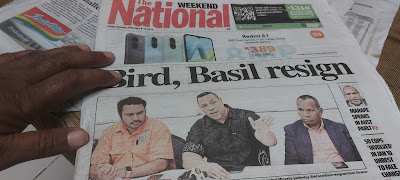Gambling in many countries is often thought of as a form of entertainment, characterized by betting or wagering something valuable or financial such as money (WHO, 2024). The furthest I have delved into gambling may have been playing Bingo when I was in the village over the Christmas holidays. But believe me when I say that gambling has risen in Papua New Guinea especially among vulnerable groups such as young people (ABC Pacific, 2023).
Casino gambling came into the scene
through the passing by PNG Parliament of the Gaming Control Bill 2007 that
allows casinos and internet gambling in PNG (Rayel et al., 2016). Over the years, as internet became easily
accessible, Papua New Guineans began to take up online gambling with some
ordinary punters loosing up to K1000 (US$300) in a year on Australian National
Rugby League betting application NRL 365 (ABC Pacific, 2023). In Australia, around 80,000 to 160,000
Australians experience problem or addictive gambling which includes a range of
negative social outcomes such as criminality, housing instability, relationship
problems, financial difficulties such as indebtedness, and domestic violence (Miller et al., 2014). This might be happening in PNG too though there
is little research being done on this. In Australia, younger men are most at
risk of falling into gambling because they are more exposed to sports betting
normalisation processes such advertising during NRL games on TV or on social
media platforms during sports updates (Seal et al., 2022).
 |
| Young people who are not careful can loose their hard earned cash to online gambling |
However, the media can be an avenue to call out addictive gambling especially newspapers which can help vulnerable groups such as young people. Firstly, Miller et al, noted that newspapers should frame stories around gambling by including the voices of problem gamblers. While these problem gamblers might be reluctant to share their stories, at least the story begins the debate around reducing the addictive nature of gambling. Journalists have a responsibility to reduce gambling in our communities by finding problem gamblers or reformed gamblers and doing their stories. Secondly, another way to tackle problem gambling is to combat it with advertising. There is already evidence that advertising leads to increased risk of gambling (McGrane et al., 2023) so newspapers must turn this around by using advertisements to reduce addictive gambling patterns by providing strategies such as setting personal limits on betting (ABC Pacific, 2023). Who will foot the advertising bill? Miller et al (2014), pointed out that there must be collaboration between the media and health organizations to develop ways to financially back advertising against gambling.
 |
| Newspapers can be a used by public health organisations to reduce gambling among young people |
So personally, I believe that if you have never tried online gambling, do not try it as it can become addictive and lead to social and health problems for you down the line. Even if you already began sports betting, seek to set a limit for bets or never bet more than you can lose. The PNG Government must also see this as a rising problem and find ways to address this before many more social and health problems arise.
References
ABC Pacific. (2023). Online
sports betting is on the rise in Papua New Guinea, but experts warn of risks
associated with gambling. Retreived from: https://www.abc.net.au/pacific/programs/pacificbeat/png-gambling/102006846
McGrane, E., Wardle, H., Clowes, M., Blank, L., Pryce, R., Field, M., Sharpe, C., & Goyder, E. (2023). What is the evidence that advertising policies could have an impact on gambling-related harms? A systematic umbrella review of the literature. Retrieved from: https://www.sciencedirect.com/science/article/pii/S0033350622003420
Miller, H. E., Thomas, S. L., Robinson, P., & Daube, M. (2014). How the causes, consequences and solutions for problem gambling are reported in Australian newspapers: A qualitative content analysis. Australian and New Zealand Journal of Public Health, 38(6), 529–535. Retreived from: https://www.sciencedirect.com/science/article/pii/S1326020023022124?via%3Dihub
Rayel, J., Manohar, P., Atu, I., & Raka, R. (2016). Gambling Tourism in PNG- A Grace or a Curse?: Implications of the Proposed Casino Gambling as Perceived by the Community. Retreived from: https://devpolicy.org/Events/2016/PNG-Update/4c_Rayel.pdf
Seal, E., Cardak, B. A.,
Nicholson, M., Donaldson, A., O’Halloran, P., Randle, E., & Staley, K.
(2022). The Gambling Behaviour and Attitudes to Sports Betting of Sports Fans.
In Journal of Gambling Studies (Vol. 38, Issue 4). Springer US. Retreived from: https://doi.org/10.1007/s10899-021-10101-7
WHO. (2024). Addictive
Behaiours: Overview. Addictive Behaviours. Retreived from: https://www.who.int/health-topics/addictive-behaviour#tab=tab_1









